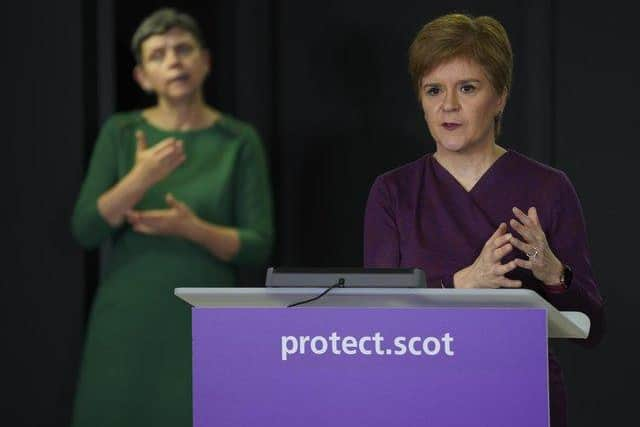Omicron in Scotland: Nicola Sturgeon pushes UK Government to increase travel restrictions
Nicola Sturgeon and Welsh First Minister Mark Drakeford have written a joint letter to Boris Johnson, Ms Sturgeon told a media briefing on Monday.
The two leaders have called for all travellers arriving from overseas to be required to self-isolate for eight days and to take a PCR test on day two and day eight of their arrival.
Advertisement
Hide AdAdvertisement
Hide AdThey also asked the Prime Minister to convene an urgent Cobra meeting to discuss the UK’s response.


Currently, passengers arriving in the UK from 4am on Tuesday will be required to take a PCR test by the end of their second day from entry and isolate until they receive a negative test, while ten southern African nations have been added to the red travel list.
Six cases of the new variant have so far been identified in Scotland. Four are in the Lanarkshire area and two in Greater Glasgow and Clyde.
Ms Sturgeon said anything other than a four-nation approach to international travel would be “ineffective”.
“As we know from earlier stages of the pandemic, with so many people travelling to Scotland and indeed to Wales via airports in England, anything less than a four nations approach to requirements like this will be ineffective, so we hope that a four nations agreement can be reached,” she said.
The First Minister refused to say what action the Scottish Government would take if Boris Johnson did not agree to tighter travel restrictions.
“We will continue to wait and see what the response is to that and hopefully we’ll have some positive discussions,” she said.
The First Minister has not ruled out further domestic restrictions or an expansion of the vaccine passport scheme, but said the situation was “fast-moving” and a response would be kept under review.
Advertisement
Hide AdAdvertisement
Hide AdThere is still a huge amount that is not known about the Omicron variant, she said, and contact tracing and surveillance in Scotland is ongoing.
“What we do know at this stage confirms in my view that we should treat it seriously and that we should continue to act on a precautionary basis at this stage,” she said.
“While we all hope that the emerging understanding of it will reduce rather than increase our level of concern, there is no doubt that this presents potentially the most challenging development in the course of the pandemic for quite some time.”
Public Health Scotland and local health protection teams are working together and “enhanced” contact tracing is being undertaken to establish the origin of the virus and any individuals the people have come into contact with in recent weeks.
All close contacts of suspected Omicron cases will be advised to self-isolate for ten days, regardless of their vaccination status.
The first two cases in the UK – in Nottingham and Essex – were announced on Saturday. A third Omicron case was detected in the UK on Sunday in a person with travel links to southern Africa.
Britain will convene an urgent meeting of G7 health ministers on Monday to discuss the variant first detected in South Africa amid concerns it could spread rapidly and partially evade existing jabs.
Responding to confirmation of the new variant in Scotland, Prof Jim Naismith, director of the Rosalind Franklin Institute and professor of structural biology at Oxford University, said: “The discovery of six cases in Scotland, some with no travel to South Africa or other ‘red’ list countries is to be expected.
Advertisement
Hide AdAdvertisement
Hide Ad“Travel is in reality all or nothing with respect to Covid-19 variants. Rapidly spreading variants will move faster than surveillance systems.
“Stopping travel to one country, whilst allowing it from others has not been particularly effective because the virus is able to take multiple transit routes.
“Similarly discriminating between who is allowed to travel into a country on citizenship grounds has not worked well, since the virus is not interested in passports.
“Local zoning in the UK failed for the same reason and has little scientific basis.
“It seems likely the Omicron variant of the virus has a foothold here.”
A message from the Editor:
Thank you for reading this article. We're more reliant on your support than ever as the shift in consumer habits brought about by coronavirus impacts our advertisers.
If you haven't already, please consider supporting our trusted, fact-checked journalism by taking out a digital subscription.
Comments
Want to join the conversation? Please or to comment on this article.